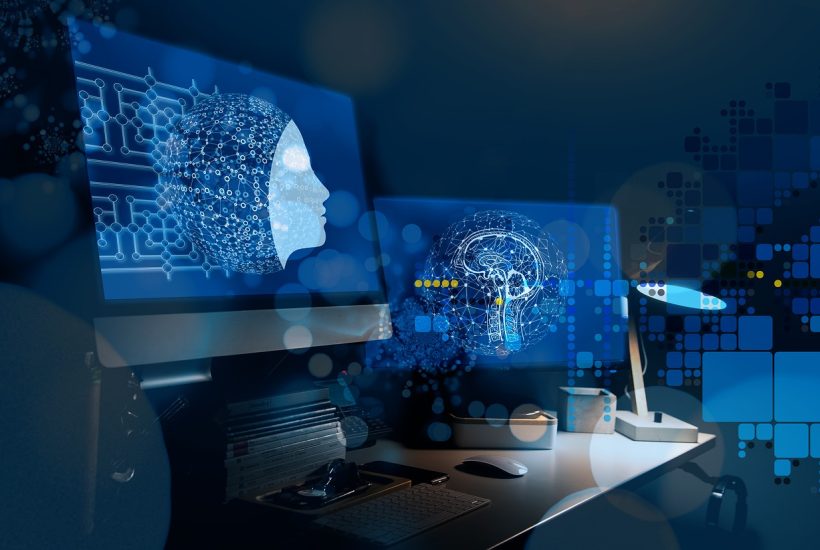Biotech
Artificial Intelligence in Healthcare to Add $1 Trillion to Indian Economy by 2035
In the cardiovascular area, Microsoft’s Healthcare AI Network and Apollo Hospitals are developing a machine learning model to better predict heart attack risk. The use of this technology lowers the cost of healthcare for these patients by providing a cardiac risk score to patients without a detailed medical examination, enabling early detection of the disease.

Artificial Intelligence (AI) to bridge the shortage of professionals. The Indian healthcare system is betting on technology to alleviate its deficit in facilities and professionals in the healthcare system and plans to invest $11.78 billion in AI by 2035, which will add one trillion dollars to its economy, according to a study by the World Economic Forum (WEF).
India, which next year will become the world’s most populous country, according to the United Nations (UN), has 64 doctors available per 100,000 inhabitants, below the world average of 150 professionals per 100,000 inhabitants. Moreover, the centers in the rural periphery, where 70% of the country’s population lives, suffer from a chronic lack of infrastructure, which makes diagnosis difficult.
The WEF states that the business of Artificial Intelligence technologies in the healthcare system will reach 372 billion dollars this year. The boom in this technology in the Asian country has been going on for a long time. Spending on AI has doubled since 2018 to $665 million.
For now, the organization Niti Aayog, close to the Indian government, has been testing the application of AI in primary care for the early detection of diabetes complications. Currently, they are preparing to use this technology as a screening tool in eye care, comparing AI diagnoses with that of specialists.
Read more about the use of artificial intelligence in the Indian healthcare system and find the most important business news of the day with the Born2Invest mobile app. Don’t waste your time scrolling the internet, download for free our companion app and stay on top of the market.
Artificial Intelligence can reduce tests performed on patients
In oncology, Tata Medical Center and the Indian Institute of Technology have launched a cancer image bank. From this archive, AI can develop machine learning models that detect biomarkers and improve cancer research outcomes.
In the cardiovascular area, Microsoft’s Healthcare AI Network and Apollo Hospitals are developing a machine learning model to better predict heart attack risk. The use of this technology lowers the cost of healthcare for these patients by providing a cardiac risk score to patients without a detailed medical examination, enabling early detection of the disease.
However, AI requires a great deal of prior information to function properly. “Patients need to be aware of how their data can be used to train AI models and be clearly informed of what factors have influenced a given treatment decision or recommendation by a physician,” said the organization, which stresses the importance of this communication in the Indian healthcare system, where, on average, a physician spends between one and two minutes with his or her patient.
They also warned that the high level of automation of the healthcare system through AI can jeopardize the ability of professionals to detect errors and that this cannot replace the healthcare infrastructure needed to ensure that patients have adequate access to healthcare personnel.
To this end, the organization argues that the Indian government needs to invest in adequate investments in data infrastructure and public-private partnership programs between academia, government, industry, and organizations.
__
(Featured image by geralt via Pixabay)
DISCLAIMER: This article was written by a third party contributor and does not reflect the opinion of Born2Invest, its management, staff or its associates. Please review our disclaimer for more information.
This article may include forward-looking statements. These forward-looking statements generally are identified by the words “believe,” “project,” “estimate,” “become,” “plan,” “will,” and similar expressions. These forward-looking statements involve known and unknown risks as well as uncertainties, including those discussed in the following cautionary statements and elsewhere in this article and on this site. Although the Company may believe that its expectations are based on reasonable assumptions, the actual results that the Company may achieve may differ materially from any forward-looking statements, which reflect the opinions of the management of the Company only as of the date hereof. Additionally, please make sure to read these important disclosures.
First published in PlantaDoce, a third-party contributor translated and adapted the articles from the originals. In case of discrepancy, the original will prevail.
Although we made reasonable efforts to provide accurate translations, some parts may be incorrect. Born2Invest assumes no responsibility for errors, omissions or ambiguities in the translations provided on this website. Any person or entity relying on translated content does so at their own risk. Born2Invest is not responsible for losses caused by such reliance on the accuracy or reliability of translated information. If you wish to report an error or inaccuracy in the translation, we encourage you to contact us.

-

 Crypto2 days ago
Crypto2 days agoBitcoin Surges Toward $110K Amid Trade News and Solana ETF Boost
-

 Fintech1 week ago
Fintech1 week agoMuzinich and Nao Partner to Open Private Credit Fund to Retail Investors
-

 Crypto5 days ago
Crypto5 days agoBitcoin Traders on DEXs Brace for Downturn Despite Price Rally
-

 Business2 weeks ago
Business2 weeks agoDebt-Fueled Markets, Zombie Corporations, and the Coming Reckoning
























